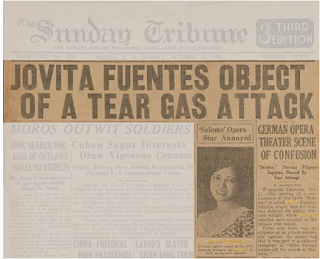 |
| Jovita Fuentes and her mother (left), Dolores Fuentes, with her impresario and pianist. |
On February 15, 2020, Jovita Fuentes could have been 125
years had she lived long enough. The theatre legend was born and raised in
Capiz but obtained her piano, and later, music education in Manila, where she
nurtured her interest in performing and eventually got the knack of it. She wanted
to teach voice but her exacting standards demanded that she should be best in
it. She decided to go to Italy to learn from the masters. But it would be
decades later before she could teach, for the European theatres and concert
halls called her. In 1925, she made her debut performance as the helpless and hapless
Cio-Cio San in Puccini’s Madam Butterfly at the Teatro Municipale in Piacenza. Her
extra-ordinary performance was noticed and she soon toured around Europe where
she performed in Germany, Austria, France, Hungary, Romania, Czechoslovakia,
Switzerland, Denmark, Sweden, Norway and Poland. She also graced the invitation
of royalties, including Queen Marie of Romania, and made friends with European
nobility and aristocracy.
Her most unforgettable roles where as Liu Yu in Puccini’s
Turandot, Mimi in Puccini’s La Boheme, Iris in Pietro Mascagni’s Iris, the
title role of Salome (which composer Richard Strauss personally offered to her
including the special role of Princess Yang Gui Fe in Li Tai Pe).
By the second half of the 1920s, Jovita Fuentes’ career
surged, but by the early 1930s, with the ascendance of the Nazi Party in
Germany, anti-foreign and anti-Jewish campaigns grew. A disturbing incident occurred
in 1932, which would serve as the beginning of another phase in her career.
On October 21, 1932, Jovita Fuentes was to perform the title
role of Salome in Wuppertal. It was a
sold-out show but towards the start of her performance, she was annoyed by the
unusual noise outside her dressing room. According to her niece, Lilia Hernandez Chung, who wrote her biography Jovita Fuentes: A Lifetime of Music (1978), the prima donna did not bother check what was
going but instead busied herself in preparing for the show. As the time
came for her to come out, she wondered why nobody in the crew knocked to tell
her that the show was about to start. Little did she know that some youths had
stormed the theatre and released teargas bombs to halt the performance. The crew
took it upon themselves to handle the situation and despite the delay the show
went on like nothing happened. Jovita delivered a yet-again stunning performance, much to
the deafening applause of the audience. It was not until the next morning that she learned about chaos, much to her shock.
The news spread quickly, reaching New York and Manila. It landed
on the front page of the Sunday Tribune. Her enraged Filipino fans could not
contain their anger. In fact, the town council of Lucban, Quezon, drafted a resolution
and sent it to the German authorities as a sign of protest.
 |
| New of the teargas incident in Germany reached Manila and landed on the front page a national daily. |
Jovita took the teargas incident and the rising German
nationalism as signs that it was time to go home. She held on a little bit and
moved to Milan, but with less and less contracts coming by, the
financially-hard-up Jovita finally decided to return home in 1933.







1 comment:
Care to share your references sir?
Post a Comment